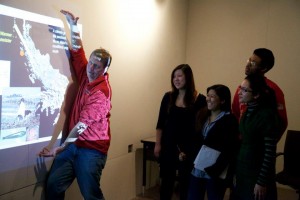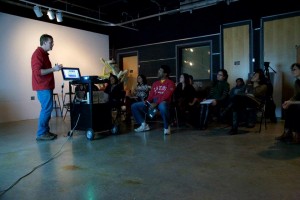
Rutgers Oceanographer Oscar Schofield explains the changing geography of the West Antarctic Peninsula
An average day at work for Biological Oceanographer Oscar Schofield usually consists of monitoring the data collected by self-propelled robots gliding across the Antarctic, or studying the phytoplankton of West Antarctic seas on a world class research vessel.
Yet for the last month, the interdisciplinary collaboration behind the documentary “Antarctica: Beyond the Ice” has lead Oscar and his studies to the most unlikely of places – Mason Gross School of the Arts.
As a part of the film’s post-production process, Oscar has provided lectures to Mason Gross documentary students to teach them the science behind the scenes for their film. Through a series of slide shows and video presentations, Oscar taught the student filmmakers a broad understanding of his research, beginning with the Biological Carbon Pump responsible for rising Antarctic temperatures to the stigmas that many people face while addressing climate change.
The novel meeting between Oscar and the film students, who mainly study English, Journalism, and other humanity concentrations, represent a larger effort that scientists are now making to bring their research to the forefront of mainstream consciousness. “We are losing the communication war on global warming,” Oscar told film students on his first lecture, hoping that this film collaboration between students and scientists will be a tool for social change and environmental policy. Oscar encourages the filmmakers that negative environmental impacts have been reversed by policymakers in the past, citing 1989’s Montreal Protocol that has successfully yielded the depletion of the Earth’s Ozone Layer. With this mind, pressure is a bit of an understatement for the students editing this important documentary.




 Follow the
Follow the  Subscribe to the blog RSS feed
Subscribe to the blog RSS feed